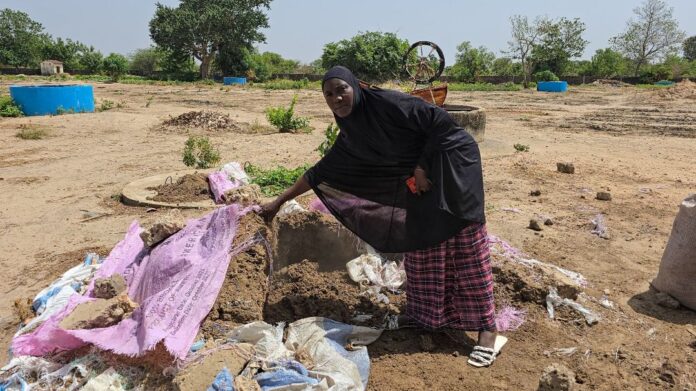By Alieu Jallow
A community-led campaign to phase out chemical fertilisers is gaining momentum in rural Gambia, with hundreds of women farmers now producing their own organic compost to grow healthier crops and protect the environment.
The initiative, led by ActionAid International The Gambia and funded by the European Union, is helping households in Central River and North Bank regions adopt sustainable farming practices through locally-led composting techniques. It has reached more than 720 participants so far, many of whom have become trainers themselves.
In Sare Birom, Balangarr, Misera, and Medina Sering Mass, women are turning waste into organic fertiliser—driven by practical training sessions that blend traditional farming knowledge with modern environmental science. For many, the impact has been life-changing.
“Before this training, I used to think waste had no value. Now, it feeds my crops, and I even earn money selling compost to neighbours,” said Fatou Sowe, a lead compost trainer in Nyagen.
In Misera, where chemical fertilisers have now been phased out, farmers report improved produce quality and more sustainable soil health. “After receiving training in Pakalinding and Wassu… our produce is now healthier and of much better quality,” said Penda Jallow, who leads a team of 31 women compost producers.
The results are measurable. One gardener in Kerr Ardo, Yasine Sowe, reported tripling her onion yield after switching to organic fertiliser.
“Before, I used to harvest only two bags of onions from 11 beds… This year, I harvested six bags from the same space,” she said.
Elsewhere, communities such as Toroba, Illiasa, and Njufen report similar successes, with over 5,800 kilograms of compost documented across 15 villages in a recent monitoring visit.
Inclusion has been a key focus of the programme. People with disabilities, though unable to take part in compost production directly, are involved in marketing and advocacy roles.
“We’re capable of raising awareness, marketing, and selling it. Others can handle the production while we focus on getting it to market,” said Ebrima Bah, a participant from Soma.
The monitoring team behind the project has recommended further support, including tools, protective gear, and expanded training for youth and persons with disabilities. There are also calls for better market links for organic products and policy reforms to restrict harmful chemical fertilisers.
What began as a pilot effort is now being seen as a model for climate-friendly farming in The Gambia. And with community trainers leading the charge, villagers say they are no longer dependent on expensive chemical inputs—and are building a healthier future from the ground up.




